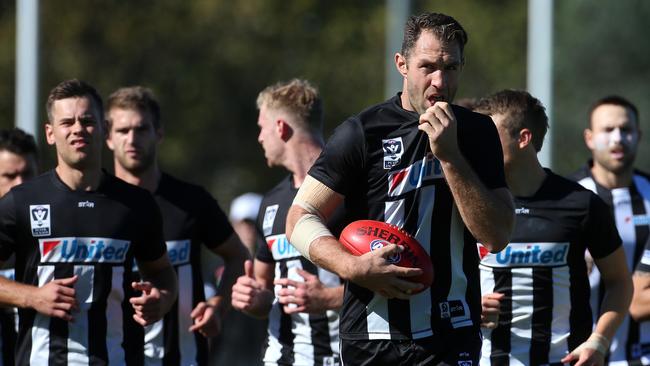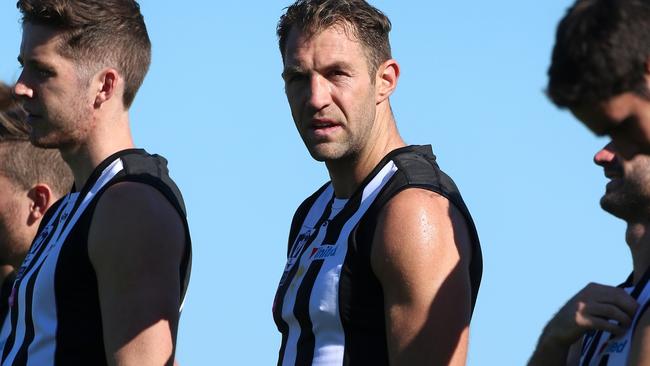How Travis Cloke can beat the relentless pressure of top-level sport
CHAMPION netballer Bianca Chatfield knows what it’s like to feel the relentless pressure of top-level sport. And how to beat it. Travis Cloke, take note.

AFL News
Don't miss out on the headlines from AFL News. Followed categories will be added to My News.
LIFE as an AFL star looks so sweet. From the outside, it’s the ultimate career.
Players earn terrific money — $300,000 a year on average. They are fulltime athletes, play a sport that all of Australia loves, attract huge TV audiences, and are forever remembered in club history.
There is a cost, though. What we often forget from the outside is that while top-level footy may look glamorous, the constant pressure to perform takes a mental and physical toll on just about everyone.
I don’t know Travis Cloke, nor have I ever run out into the MCG in front of 80,000 screaming fans, but I was an elite netballer for 17 years and in that time I learnt a hell of a lot about what it takes to produce your best, in the best of company. And how to fight back from the abyss.
No one is immune to a form slump. It doesn’t matter how amazing you are, you’ve either experienced one before or will experience one soon.
I had plenty of ups and downs in my career — played woefully in important matches, was dragged from the court when I was captain, and been embarrassingly dropped from the Australian team when I was meant to be at the peak of my career.
After four years preparing, an opportunity to play at the Commonwealth Games in Delhi was gone because I wasn’t in form or favour. I knew I wasn’t playing at my best but the harder I tried, the worse I got.
I didn’t know how to handle it. I didn’t want to speak about it, I wanted to run away and pretend it never happened. It made me realise how netball-centric my life had become and I hated that. I needed balance.
I know netball isn’t subjected to the media scrutiny that the AFL is, but still in the netball bubble it seemed hard enough to escape.
I can only imagine being a player like Cloke, a premiership star on a big contract, with thousands of people who feel compelled to give an opinion on his form, on how he should play, and tell him and whoever will listen that he’s done. Career over.
The thing that many people don’t get, no matter how much noise is created by others — coaches, media, family, teammates — you have to be the one to admit you are struggling, and ask for help from those around you that you trust.
That’s the first step, and without that, there can’t be a second one, and a third ...
You have to be the one that manages yourself back. No one else can do it for you.

The hardest part when you are dropped, injured or out of form, is someone takes your spot. In comes a young up-and-comer like Mason Cox and the world goes crazy about his success.
As a teammate you are genuinely happy he got to play his first game and excited the team has won, but deep down you become more frustrated that you weren’t part of it. Potentially you can feel even more lonely and isolated from the rest of the team.
A team sport means you rely heavily on your teammates, you see them daily, you share a vision, you share a club and together you always celebrate the wins and lean on each other during the losses. When you are forced to the fringes of that group, it can feel like you lose that as well.
Football in this town is unbelievable in how much scrutiny the players are under.
Any person with the vaguest interest in sport knows that Cloke is struggling so he can’t hide. He has to fake a smile for the cameras daily, or not and risk standing accused of sulking.
Travis is Travis and I can’t pretend to know the intimate details of his struggles, but I do know what has worked for me when I was down and up against it.
One skill I developed was the ability to understand and control my thoughts and emotions. You can’t waste energy or time worrying about what other people think of you, you ultimately can only control your own thoughts — including what goes through your head when you are in the heat of the moment.
Novak Djokovic practices mindfulness, Paul Roos is a believer, and so is Phil Jackson, one of the greatest NBA coaches.
If you’re aren’t familiar with it, don’t roll your eyes. I guarantee it can help everyone in whatever they do on a daily basis.
It’s about noticing what your thoughts are, and acknowledging when you are worrying too much about the past or future. It’s creating a calmness and stillness that allows you to concentrate on the current moment. Try it.
When you have to perform under pressure, take that clutch shot at goal with the world watching, you have to be in control of what is happening between your ears, that space nobody else can possibly control but you.
Being aware and able to acknowledge what’s going on in my head has changed my world.
Don’t get me wrong, it wasn’t a miracle cure and didn’t make me an instantly better player, but it taught me to master my thoughts, my thinking.
And that was just as important, if not more so, than my ability to control the ball.


 It’s creating a calmness and stillness that allows you to concentrate on the current moment. Try it
It’s creating a calmness and stillness that allows you to concentrate on the current moment. Try it



